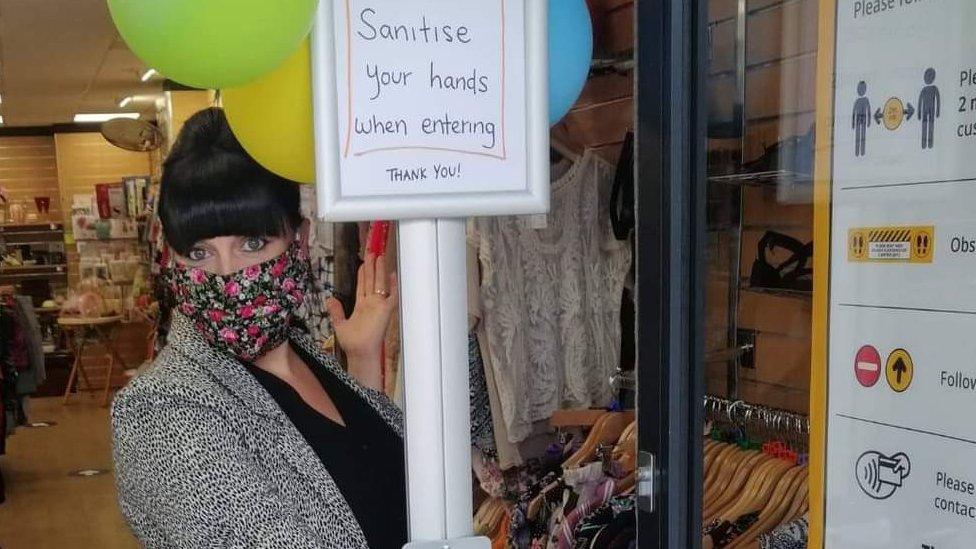Charity shops: Six things to check before you drop off your old stuff
- Published
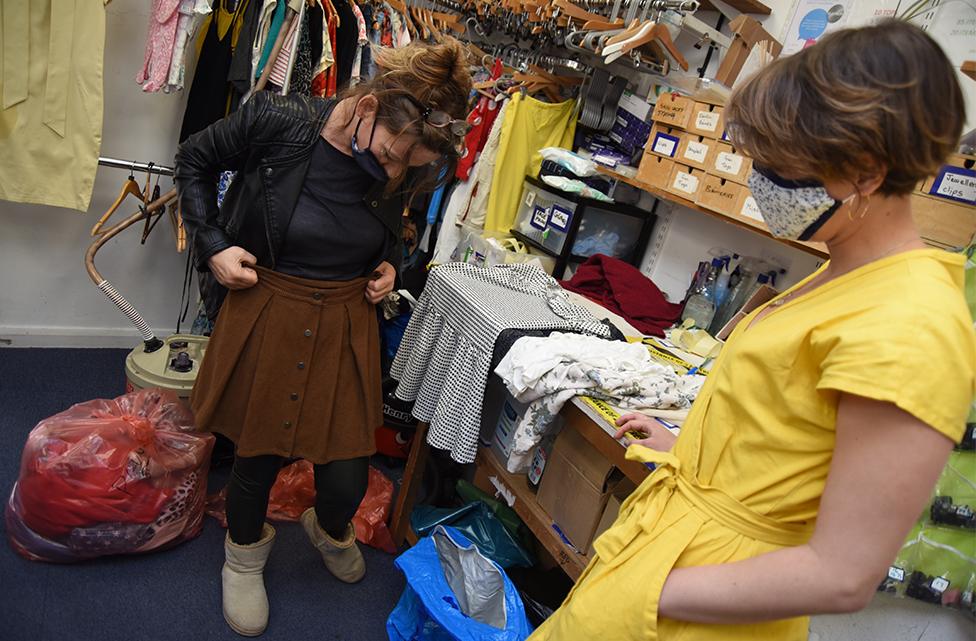
Charity shops have been asking people to call and check before they drop off donations, in part due to fears of a pent-up demand to donate after England's third lockdown ended. Picking up the phone is easy, but knowing what to check might be a little bit harder. So what should you be asking yourself about your potential donations?
1. Have you washed it?
"We get dirty pants donated sometimes," says Grace Waring, 53, as she brings out a new load of donations to the shop floor at Cancer Research UK, in Blackheath, south London. She's worked here for seven years, and says some people still don't realise the shop doesn't have a washing machine.
"We're not a recycling plant and we're not a laundrette," she says.
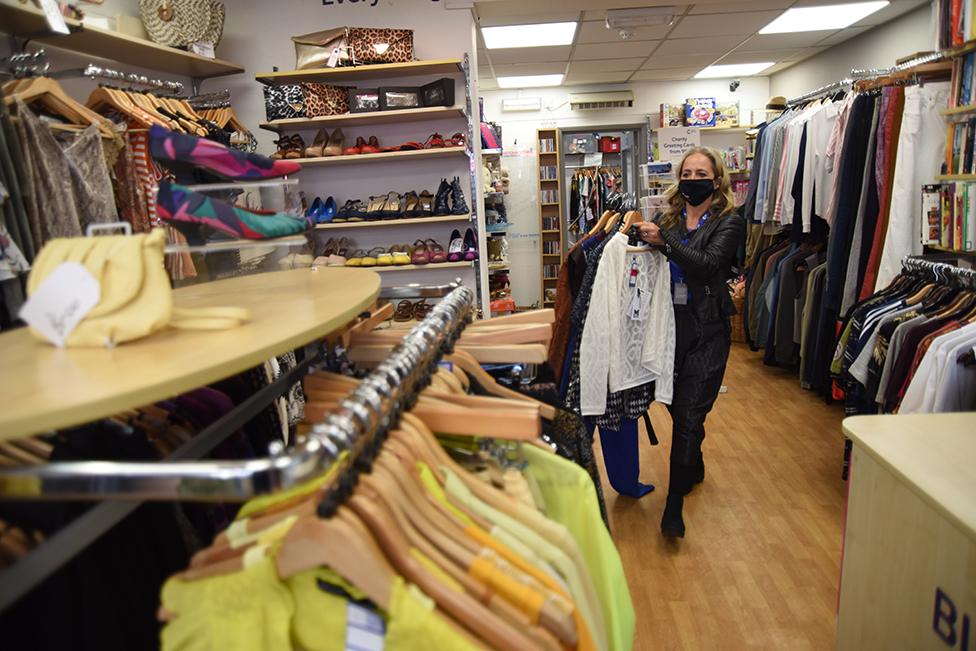
Grace started off as a volunteer and but is now an assistant manager
Donations to Cancer Research UK across the country were 17% higher than usual in the week after 12 April, when non-essential shops reopened in England - and this branch is no exception.
In a small room at the back of the shop, Maureen Mann, 51, has been working non-stop all morning. She arrived in leather lace-up heels but has slipped on a pair of fleece-lined boots to shift through the donations. "As soon as I get to work these come on and I'm just running about," she laughs, adjusting her glasses to get a better look at a blue t-shirt on the top of a pile of donations.
"Is that a stain? Sometimes you've got tie-dye and you're like - is that a stain or not?" The T-shirt goes into a barrel that will be picked up by recycling merchants. Cancer Research UK says these companies often work in developing countries, and this a final opportunity to avoid landfill.
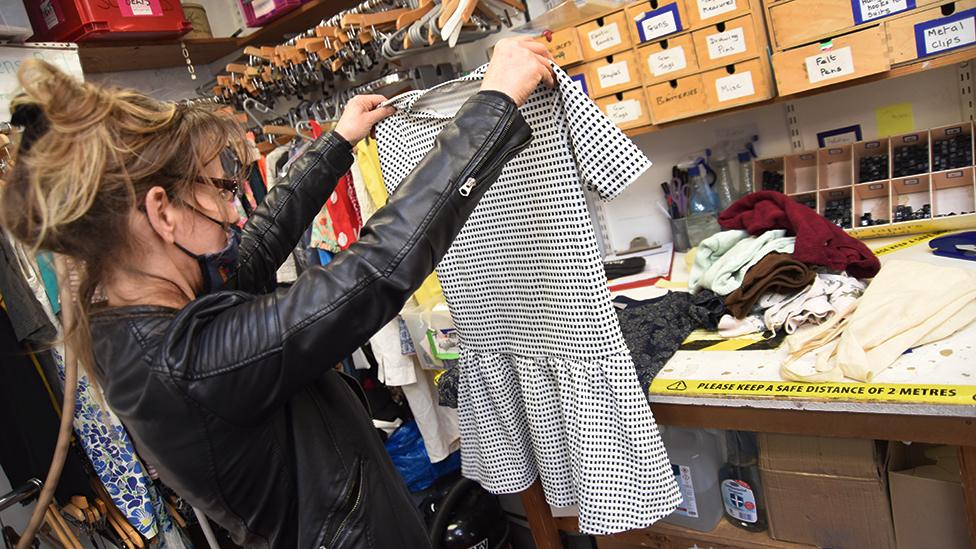
Shop manager Maureen says winter things can still be donated - they're just stored upstairs until they're ready to go out
2. OK, but have you *really* washed it?
Maureen jokes that she can tell what state the donations might be from the quality of the bin bags they come in. And there's no need for a "smell test" - most of the time it's obvious. "Sometimes the smell just comes to you straight away - you open the bag and it's like, 'whoa'," she says.
The good news is donations don't need to be ironed and folded, as they're stored in bin bags in rooms upstairs before they make it to the shop floor. They're then steamed by volunteers like Doreen De Bellotte, who is going through some of the items that are ready to go onto the rails. "It's a really nifty gadget," she says.
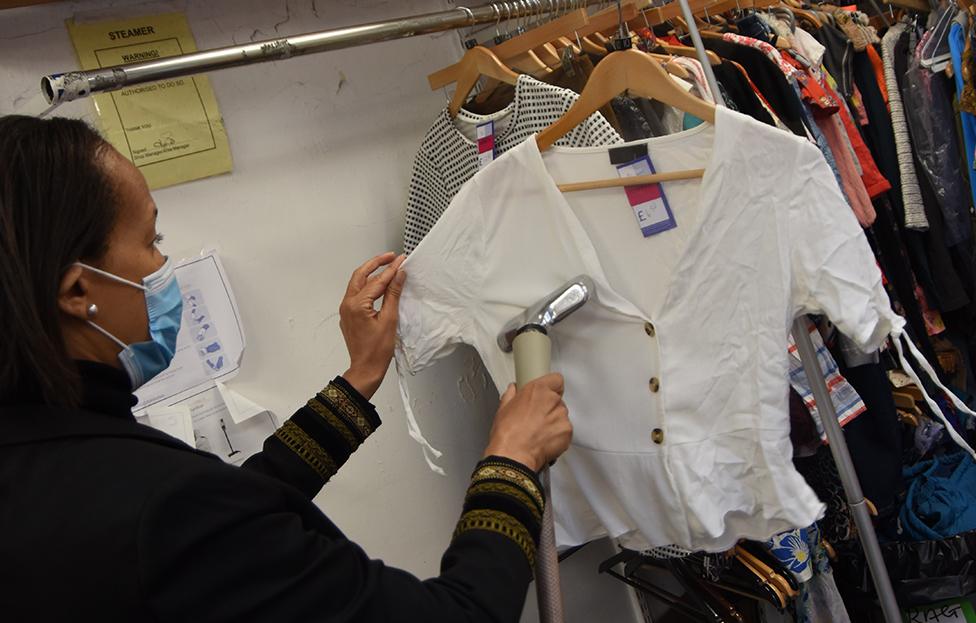
Doreen says she volunteers for Cancer Research UK because of her own experience finding a benign tumour at just 19
3. Would you wear it yourself?
A few customers milling around in the shop tell me they had clear-outs during lockdown and have piles of things destined for charity at home. I'm guilty as charged. But charity shops are unlikely to want all your cast-offs.
I've brought in my own bag of donations (cobbled together back in February) and ask Maureen to cast her expert eye over it. I promise her I won't be offended.
First up is a red jumper - I think from Sainsbury's - which was a Christmas present from my mum a couple of years ago. Maureen's verdict? "No, it's gone too bobbly." That one goes straight into the recycling barrel. Sorry, mum.
Some of my donations do make the cut, though. Among them are a white Topshop blouse ("Because of the young ones, I'll put that out," says Maureen), a sparkly Vera Moda top, and a brown skirt from Zara that I think I wore to sixth form. "This is a thing that will never date, though," says Maureen, taking out a pricing gun. "This colour's in."

Some of my items made it on to the shop floor after the creases were steamed out
4. Would this charity shop sell it?
It's worth considering that different charity shops might sell different things, and asking yourself whether your donations are right for your chosen shop. Most things at this branch are high quality and sell for at least £6.
Any donations of more affordable high street brands that Maureen and Grace think will sell for less are passed on to on of the charity's "superstores", which sell items for £5 or less. That's where my old patterned jumper from New Look is headed, Maureen tells me, as she puts it into a big red bag labelled "pound shop".
The pair of them are quick at divvying-up items; they can tell whether an item should be passed to a superstore with a quick glance at the label. If they don't recognise a brand, they check what it usually sells for on eBay. That's the case with a black and white dress from Australian brand Atmos & Here (given to me, or maybe loaned, by a friend from Sydney), which they end up pricing at £12.
That's not bad, but it pales in comparison to the money they make from some items sold here. A model who lives nearby sometimes donates outfits he's worn once the catwalk, and Grace says a new Acne Studios jacket, worth £2,000, sold for £650 the other week. "Charity shops are like a treasure chest," she says.
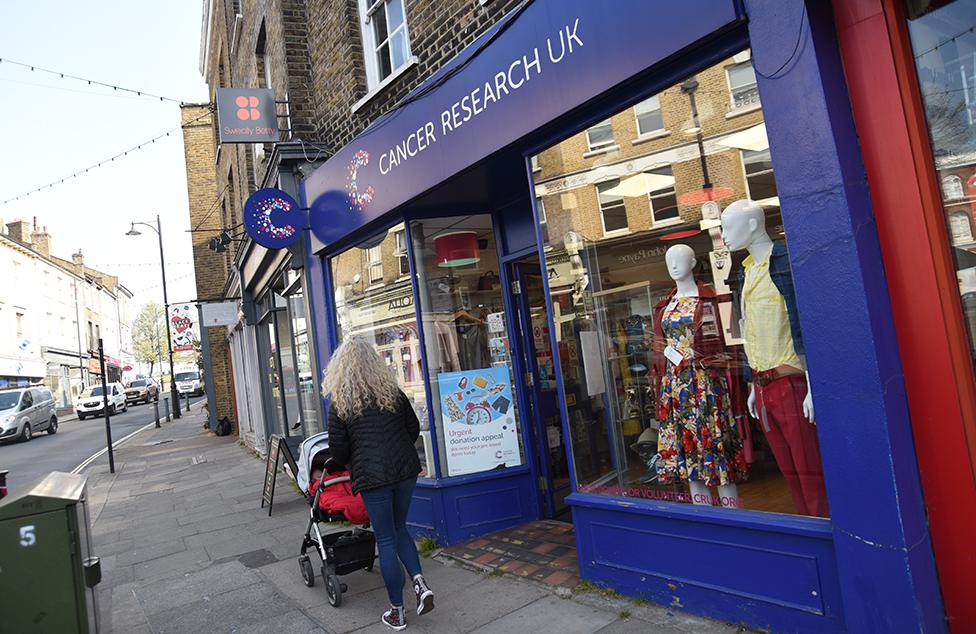
Maureen and Grace say they can pass on some donations to other local charity shops that tend to sell more of a certain type of thing, like books or homeware
5. Is that definitely the right DVD?
Grace says they try to check every donation is fit for sale, but on a rare occasion things do slip through the net. She remembers one customer who brought a copy of the Sound of Music to the till, wanting to buy it as a present for her daughter. The DVD was one of a collection of vintage films brought in the week before by a woman who had been clearing out some of her husband's old things. Luckily, Grace checked the disc before scanning it.
"Inside the cases were not what was on the front cover," she giggles. "He had a whole range of naughty stuff."
Grace gets chatting to Mary, a customer on the shop floor who says she has a pile of toddler toys and board games at home to donate, including jigsaw puzzles. "If they're complete, let us know they're complete," says Grace. "Because otherwise someone has to count all those bits. We check everything."
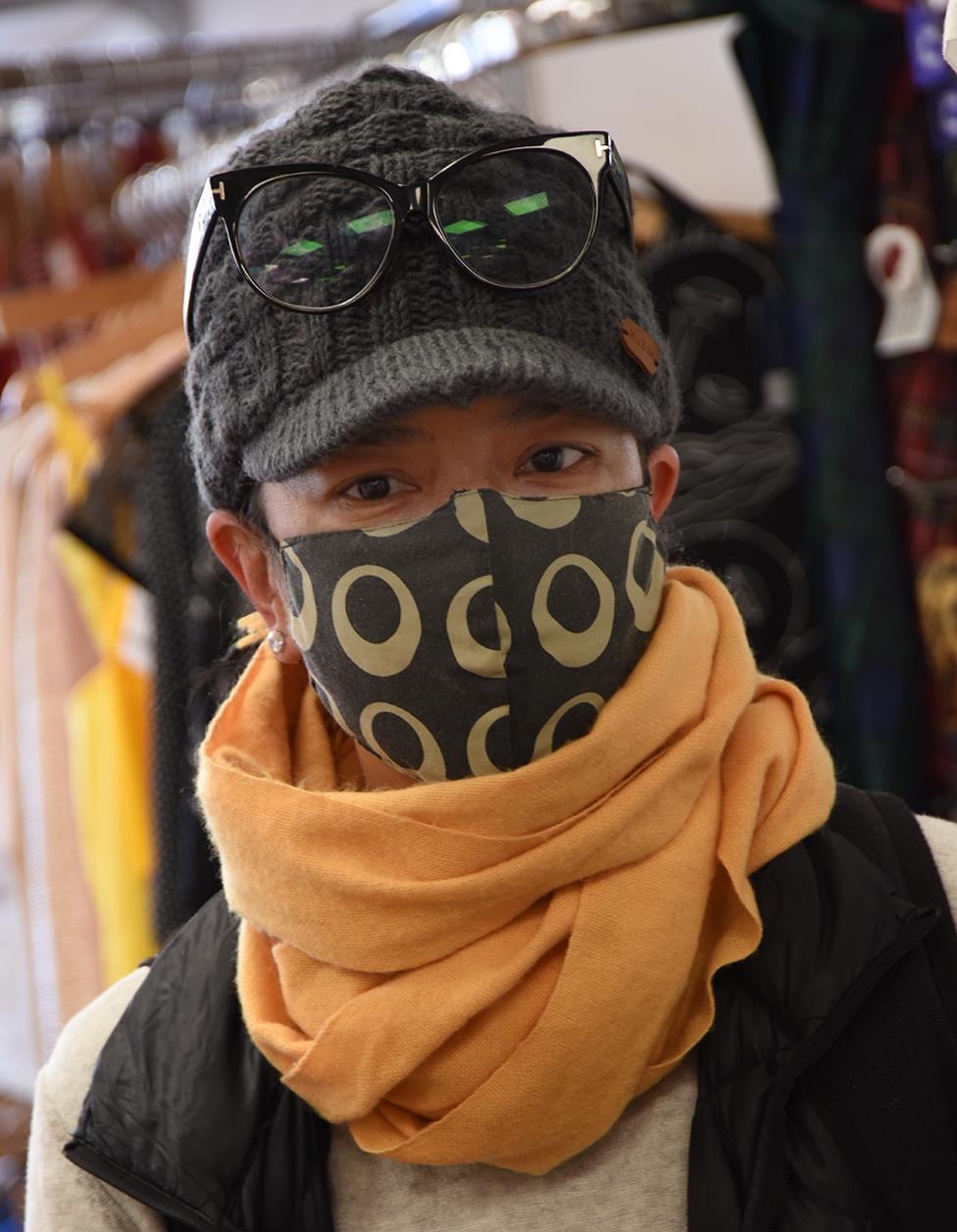
Mary is one of those who stored up donations after a clear-out during England's latest lockdown
6. Is this the right charity for you?
It might be the nearest shop is the most convenient place to drop off donations, but for some people the cause itself is important.
This charity has come to mean a lot to Mary since her mother died from cancer. "I do like to support the cause," she says. "I grew up in the States, in New York. My mum was very frugal, so we bought all of our clothes from charity shops. We rarely bought new things. "
Grace says hearing customers' stories and giving them a "safe space" to talk makes her job worthwhile. "It's shattering turning over all the donations, it's hard work - especially now post-Covid," she says.
"Sometimes you have a day when you're so shattered, your body is shot, but you know you've made a difference. It does open your eyes and your heart."
Related topics
- Published15 April 2021
